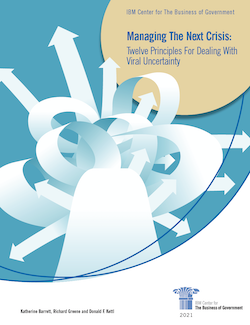This post first appeared on IBM Business of Government. Read the original article.

A new Center report identifies 12 areas where government action can make a meaningful difference in moving forward today and managing for tomorrow.
This blog is co-authored by Dan Chenok, Executive Director, IBM Center for The Business of Government.
Governments and societies continue to face the unforeseen and unprecedented challenges of responding to and recovering from the COVID-19 pandemic. The experiences of the last 18 months have pointed to the importance of well-managed actions at the local, national, and cross-border levels. Many of these steps address issues that are now well-documented, including medical support for testing, contact tracing, and vaccine management; supply chain challenges around vaccine production and distribution; impacts on local job markets; and the importance of addressing equity in delivering needed social services.
A new report for our Center, Managing the Next Crisis: Twelve Principles for Dealing With Viral Uncertainty, steps back to understand how governments have operated in developing strategies and programs to address these global, societal challenges. The report is authored by Katherine Barrett and Richard Greene— Senior Advisors, Columnists and co-chairs of the Advisory Board for Route Fifty — and Donald F Kettl—Professor Emeritus and Former Dean of the University of Maryland School of Public Policy (all are also advisors for the Volcker Alliance and Fellows of the National Academy of Public Administration and renowned experts on governance at all levels). The authors present twelve principles, each accompanied by a recommended set of actions, for government to follow in addressing future crises. Importantly, these principles and actions can enable government officials to help their constituencies advance through the current stages of COVID response and recovery, and to emerge stronger and more resilient.
The twelve principles and associated actions identified in the report address three critical imperatives for managing through the pandemic and preparing for the future, as outlined below.
Building partnerships with key organizations in the public, private, and nonprofit sectors
- Local governments inevitably sit on the frontlines in responding to a crisis, but the federal government plays a critical role in coordinating responses because when one community is under siege, others may soon follow.
- The federal government can help lead the charge against a widespread crisis, but its primary responsibility often involves obtaining buy-in from and coordinating the efforts of states, counties, and cities.
- Data is key to understanding a problem well enough to develop a solution. But the various players responding to a crisis must be able to communicate with one another using consistent terms, definitions, and methodology for the data.
- Solutions to many major crises, from wildfires to hurricanes to the pandemic, require assets like hoses, sandbags, masks, and vaccines. Central coordination for their procurement prevents the various players involved from competing against one another, which can lead to higher prices and unnecessary shortages.
Managing networks needed to drive such partnerships to overcome challenges, through improving operations and service delivery.
- The pandemic demonstrated an increasing shortage of the necessary personnel to deal with a health care crisis. The nation must develop better means for growing the next generation of experts in multiple fields who can serve in times of need.
- Technology is a central element to solving most modern problems, though not the only element. Artificial intelligence can help governments to better understand problems and form solutions.
- Unlikely events that have high potential consequences still require preparation. Risk management can help weigh the odds and spell out plans for future calamities.
- When addressing a major crisis, organizing all the participants trying to respond is necessary. Unfortunately, these kinds of networks must be consciously formed—they do not come together spontaneously.
Steering outcomes across networks that lead to well-understood and measurable improvements in the health and well-being of the public.
- When many people face great risk, they must trust those who lead response and recovery—or those interventions are severely impeded.
- States and localities often help find solutions by trying a variety of different approaches to solving a problem. But ignoring the lessons learned across the states makes their experiments less productive. 1
- For the United States to progress, the population as a whole must be treated fairly. The pandemic revealed that without addressing social and economic inequities, disasters will harm huge segments of the population disproportionately—and that, in turn, can unravel the fabric of society.
- Holding institutions and individuals accountable helps ensure responsible actions. This requires knowing exactly how to define and measure success.
This report builds on recent work from our Center to help governments address and move forward in the face of the COVID pandemic, including:
- COVID-19 and its Impact: Seven Essays on reframing Government Management and Operations;
- a series of blogs from both Don Kettl; and
- a series of blogs with IBM expert perspectives around how governments can leverage resiliency to emerge stronger.
We hope this report provides useful insights for government officials at all levels to move forward effectively from the current pandemic, and better prepare for the inevitability of future crises.
